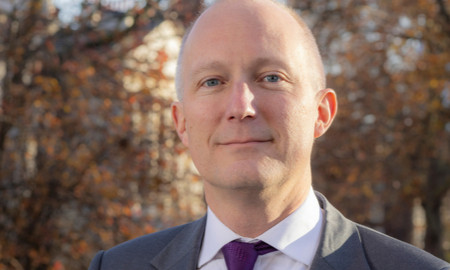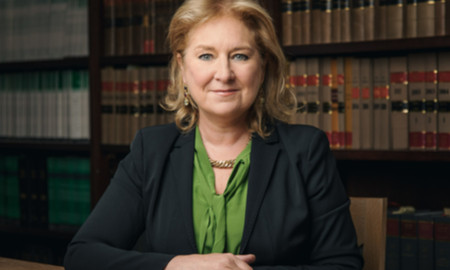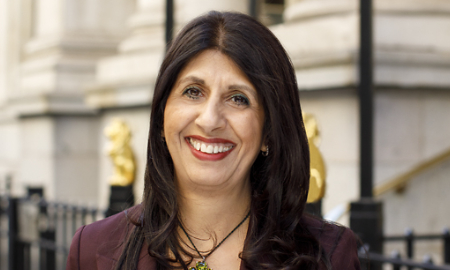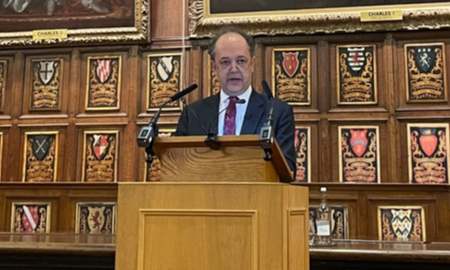Sign up for our free daily newsletter
YOUR PRIVACY - PLEASE READ CAREFULLY DATA PROTECTION STATEMENT
Below we explain how we will communicate with you. We set out how we use your data in our Privacy Policy.
Global City Media, and its associated brands will use the lawful basis of legitimate interests to use
the
contact details you have supplied to contact you regarding our publications, events, training,
reader
research, and other relevant information. We will always give you the option to opt out of our
marketing.
By clicking submit, you confirm that you understand and accept the Terms & Conditions and Privacy Policy
Sam Townend KC, the new chair of the Bar Council of England and Wales, has identified as his key priorities securing more resources for the justice system and supporting the profession to become more resilient and sustainable.
Delivering his inaugural speech at Lincoln’s Inn this week (9 January), Townend said the criminal and family courts urgently needed investment.
“I put it bluntly: the criminal and family justice systems are at the point of structural failure,” he said in a speech largely, but not wholly, aimed at a domestic audience, with both Attorney General Victoria Prentis KC and shadow Attorney General Emily Thornberry in attendance. “The need for significant investment is great, and it is urgent.”
The construction specialist based at Keating Chambers pointed to a collapse in the percentage of guilty pleas being entered at the first hearing in criminal cases, which he put down to delays in the Crown Court leading “young criminal men, who should be pleading guilty at an early stage” to realise that “their day of reckoning is getting pushed back further and further and perhaps may never come at all”.
He said this bore witness to “a breakdown in the compact essential to any effective criminal justice system governed by the rule of law” in allowing perpetrators to plead guilty early for a discounted sentence and the start of rehabilitation. He claimed this trend “put the criminal courts system, already running at close to boiling point, under unbearable pressure”.
He added: “The present financial settlement… is like being asked to make two loaves of bread but having the ingredients for less than one. Publicly funded lawyers are good, but they are not miracle workers.”
Family law
With his vice-chair, family silk Barbara Mills KC looking on, he said the family court system was also plagued by delays fuelled by the withdrawal of legal aid for most family law litigants in 2012, which also put “the party who has the power and the money at a significant advantage”.
He added: “The problem in family matters is a structural one... it is hard to resist the conclusion that what we are witnessing is a chronic decline in the effectiveness of the family justice system.”
With 2024 being a general election year, Townend, a former Labour councillor, called on politicians of all parties to invest in the justice system, having earlier made it clear that, as chair, he now spoke for the Bar as a whole, and left his personal views behind for his term of office.
He said: “It is utterly disappointing that neither [of the main political parties] has yet committed itself to apply the resources needed, and yet each keeps identifying more new offences and proposing greater demands on the criminal justice system… frankly, if you wish the ends you have to provide the means.”
He also urged politicians to deprecate political attacks on lawyers, saying: “Some public words by leading Conservative and Labour lawyer politicians… to help explain the role of lawyers would be extremely welcome.”
Resilience
On the theme of resilience and sustainability, Townend, who was state school-educated and a grant-maintained student at Cambridge University, identified areas “where the Bar must get its own house in order” including the need for further action implementing the recommendations of the Race at Bar Report 2021 and investigating the 17% earnings gap between male and female barristers at 0-3 years’ call.
He also promised to deliver on a commitment made in December to commission a review after the biennial Barristers’ Working Lives survey found growing numbers of barristers had experienced inappropriate and unacceptable behaviour.
Describing bullying, harassment and discrimination as “an unacceptable, systemic problem that requires a significant response”, he said: “Repeat offenders, committing acts of harassment and discrimination, those who repeatedly target women or people of colour, need to be formally disciplined.”
He also maintained that unprofessional and bullying behaviour that did not meet the threshold for actional misconduct needed to be called out.
“All of us… need to take advantage of the informal means of addressing this behaviour that are available, whether through simply recognising the behaviour for what it is and acknowledging it to the person who has suffered it or through raising matters informally.”
On regulation, Townend welcomed an improvement in the Bar Standards Board’s (BSB’s) performance but called for greater value for money and lower regulation costs.
He also queried a suggestion in a consultation by the BSB on the regulation of barristers in chambers that smaller chambers should voluntarily merge, as he put it, “simply for the purposes of making regulatory compliance more comprehensive and easier”.
Year of call
He addressed an ongoing debate over whether the custom should continue of calling law school graduates to the Bar at the four Inns of Court before they have completed their training, thereby allowing them to describe themselves as non-practising barristers.
He made it clear that the Bar should not regulate the thousands of non-practising barristers and questioned claims the status quo enhanced the Bar’s soft power internationally due to the large numbers of international non-practising barristers.
“Much heat has been caused on this debate over decades,” he said. “However, stepping back plainly, you would not start here. In my view, and I believe it reflects the mainstream view of the practising Bar, in this respect, the Bar should be in line with other professions.”
In a tonally different speech to his predecessor, Nick Vineall KC, who called for a government review of the Legal Services Board (LSB), the profession’s oversight regulator, he welcomed a forthcoming review of the LSB’s internal governance rules.
Addressing the oversight regulator’s role in firm but emollient terms, he said the current rules had the effect of “denuding the approved regulators of any effective role”. He called for a rebalancing of the relationship in terms likely to be approved by his Law Society counterparts.
Email your news and story ideas to: [email protected]











